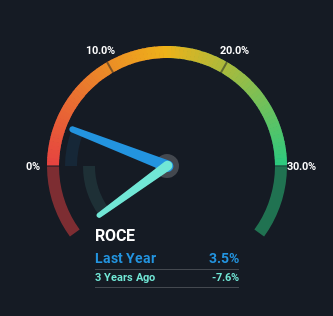- United States
- /
- Hospitality
- /
- NYSE:H
Slowing Rates Of Return At Hyatt Hotels (NYSE:H) Leave Little Room For Excitement

Finding a business that has the potential to grow substantially is not easy, but it is possible if we look at a few key financial metrics. Typically, we'll want to notice a trend of growing return on capital employed (ROCE) and alongside that, an expanding base of capital employed. If you see this, it typically means it's a company with a great business model and plenty of profitable reinvestment opportunities. However, after briefly looking over the numbers, we don't think Hyatt Hotels (NYSE:H) has the makings of a multi-bagger going forward, but let's have a look at why that may be.
What Is Return On Capital Employed (ROCE)?
Just to clarify if you're unsure, ROCE is a metric for evaluating how much pre-tax income (in percentage terms) a company earns on the capital invested in its business. Analysts use this formula to calculate it for Hyatt Hotels:
Return on Capital Employed = Earnings Before Interest and Tax (EBIT) ÷ (Total Assets - Current Liabilities)
0.035 = US$318m ÷ (US$13b - US$3.7b) (Based on the trailing twelve months to June 2024).
Therefore, Hyatt Hotels has an ROCE of 3.5%. Ultimately, that's a low return and it under-performs the Hospitality industry average of 10%.
See our latest analysis for Hyatt Hotels

Above you can see how the current ROCE for Hyatt Hotels compares to its prior returns on capital, but there's only so much you can tell from the past. If you'd like to see what analysts are forecasting going forward, you should check out our free analyst report for Hyatt Hotels .
What The Trend Of ROCE Can Tell Us
There are better returns on capital out there than what we're seeing at Hyatt Hotels. The company has consistently earned 3.5% for the last five years, and the capital employed within the business has risen 29% in that time. Given the company has increased the amount of capital employed, it appears the investments that have been made simply don't provide a high return on capital.
Another point to note, we noticed the company has increased current liabilities over the last five years. This is intriguing because if current liabilities hadn't increased to 29% of total assets, this reported ROCE would probably be less than3.5% because total capital employed would be higher.The 3.5% ROCE could be even lower if current liabilities weren't 29% of total assets, because the the formula would show a larger base of total capital employed. So while current liabilities isn't high right now, keep an eye out in case it increases further, because this can introduce some elements of risk.
The Key Takeaway
In conclusion, Hyatt Hotels has been investing more capital into the business, but returns on that capital haven't increased. Although the market must be expecting these trends to improve because the stock has gained 94% over the last five years. However, unless these underlying trends turn more positive, we wouldn't get our hopes up too high.
One more thing: We've identified 3 warning signs with Hyatt Hotels (at least 1 which is concerning) , and understanding these would certainly be useful.
While Hyatt Hotels isn't earning the highest return, check out this free list of companies that are earning high returns on equity with solid balance sheets.
Valuation is complex, but we're here to simplify it.
Discover if Hyatt Hotels might be undervalued or overvalued with our detailed analysis, featuring fair value estimates, potential risks, dividends, insider trades, and its financial condition.
Access Free AnalysisHave feedback on this article? Concerned about the content? Get in touch with us directly. Alternatively, email editorial-team (at) simplywallst.com.
This article by Simply Wall St is general in nature. We provide commentary based on historical data and analyst forecasts only using an unbiased methodology and our articles are not intended to be financial advice. It does not constitute a recommendation to buy or sell any stock, and does not take account of your objectives, or your financial situation. We aim to bring you long-term focused analysis driven by fundamental data. Note that our analysis may not factor in the latest price-sensitive company announcements or qualitative material. Simply Wall St has no position in any stocks mentioned.
About NYSE:H
Hyatt Hotels
Operates as a hospitality company in the United States and internationally.
Undervalued slight.
Similar Companies
Market Insights
Community Narratives


